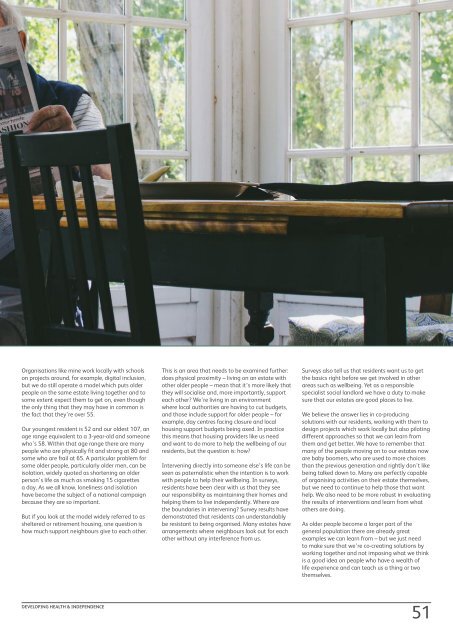The Vision Project
Throughout 2019, Developing Health & Independence (DHI), have been marking their 20th anniversary as a charity by looking to the future. Through articles, events and podcasts, they've asked people to answer the question of how we can achieve their vision of ending social exclusion. This collection of articles includes the contributions of experts from across public life and the political spectrum.
Throughout 2019, Developing Health & Independence (DHI), have been marking their 20th anniversary as a charity by looking to the future. Through articles, events and podcasts, they've asked people to answer the question of how we can achieve their vision of ending social exclusion. This collection of articles includes the contributions of experts from across public life and the political spectrum.
You also want an ePaper? Increase the reach of your titles
YUMPU automatically turns print PDFs into web optimized ePapers that Google loves.
Organisations like mine work locally with schools<br />
on projects around, for example, digital inclusion,<br />
but we do still operate a model which puts older<br />
people on the same estate living together and to<br />
some extent expect them to get on, even though<br />
the only thing that they may have in common is<br />
the fact that they’re over 55.<br />
Our youngest resident is 52 and our oldest 107, an<br />
age range equivalent to a 3-year-old and someone<br />
who’s 58. Within that age range there are many<br />
people who are physically fit and strong at 80 and<br />
some who are frail at 65. A particular problem for<br />
some older people, particularly older men, can be<br />
isolation, widely quoted as shortening an older<br />
person’s life as much as smoking 15 cigarettes<br />
a day. As we all know, loneliness and isolation<br />
have become the subject of a national campaign<br />
because they are so important.<br />
But if you look at the model widely referred to as<br />
sheltered or retirement housing, one question is<br />
how much support neighbours give to each other.<br />
This is an area that needs to be examined further:<br />
does physical proximity – living on an estate with<br />
other older people – mean that it’s more likely that<br />
they will socialise and, more importantly, support<br />
each other? We’re living in an environment<br />
where local authorities are having to cut budgets,<br />
and those include support for older people – for<br />
example, day centres facing closure and local<br />
housing support budgets being axed. In practice<br />
this means that housing providers like us need<br />
and want to do more to help the wellbeing of our<br />
residents, but the question is: how?<br />
Intervening directly into someone else’s life can be<br />
seen as paternalistic when the intention is to work<br />
with people to help their wellbeing. In surveys,<br />
residents have been clear with us that they see<br />
our responsibility as maintaining their homes and<br />
helping them to live independently. Where are<br />
the boundaries in intervening? Survey results have<br />
demonstrated that residents can understandably<br />
be resistant to being organised. Many estates have<br />
arrangements where neighbours look out for each<br />
other without any interference from us.<br />
Surveys also tell us that residents want us to get<br />
the basics right before we get involved in other<br />
areas such as wellbeing. Yet as a responsible<br />
specialist social landlord we have a duty to make<br />
sure that our estates are good places to live.<br />
We believe the answer lies in co-producing<br />
solutions with our residents, working with them to<br />
design projects which work locally but also piloting<br />
different approaches so that we can learn from<br />
them and get better. We have to remember that<br />
many of the people moving on to our estates now<br />
are baby boomers, who are used to more choices<br />
than the previous generation and rightly don’t like<br />
being talked down to. Many are perfectly capable<br />
of organising activities on their estate themselves,<br />
but we need to continue to help those that want<br />
help. We also need to be more robust in evaluating<br />
the results of interventions and learn from what<br />
others are doing.<br />
As older people become a larger part of the<br />
general population there are already great<br />
examples we can learn from – but we just need<br />
to make sure that we’re co-creating solutions by<br />
working together and not imposing what we think<br />
is a good idea on people who have a wealth of<br />
life experience and can teach us a thing or two<br />
themselves.<br />
DEVELOPING HEALTH & INDEPENDENCE<br />
51




